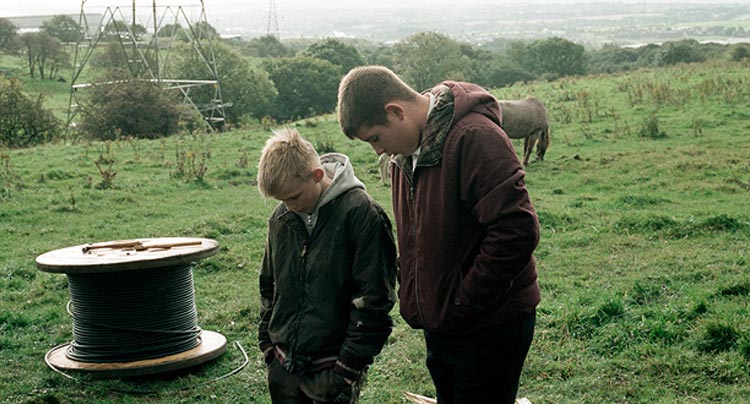
A simple, tragic, and ultimately moving work.

A simple, tragic, and ultimately moving work.
After making the incredibly devastating pseudo-documentary The Arbor, Clio Barnard has returned with her own original story for The Selfish Giant. Loosely inspired by Oscar Wilde’s short story of the same name, it takes place in the same area Barnard profiled in her last film. After a gorgeous opening shot, the film jarringly cuts to Arbor (Conner Chapman) lying under his bed screaming at the top of his lungs. His violent tantrum only ends when his best friend Swifty (Shaun Thomas) holds his hand. The shot of Arbor and Swifty’s hands held tight is one of several images that, when revisited later on in the film, pack an emotional wallop that would be hard to find in most films from this year. Clearly inspired by Ken Loach’s films and the work of Andrea Dunbar (her subject for The Arbor), The Selfish Giant is a simple, tragic and ultimately moving work.
Arbor and Swifty begin to take an interest in a local scrap yard owner named Kitten (Sean Gilder) when they catch some of his workers stealing copper wire. Arbor wants to go around collecting scrap metal, while Swifty takes an interest in riding Kitten’s horse for local races. Problems begin to arise when Arbor, whose destructive behavior and belligerent attitude towards any of his superiors, gets expelled from school. The separation between Arbor and Swifty begins to wear down their friendship, and when Kitten takes a liking to Swifty over Arbor feelings of jealousy begin to tear them apart.

Chapman and Thomas, both making their feature debuts, are seriously impressive. Chapman gives his all as Arbor, creating a brash and loud character who relies on his best friend’s calm demeanor to balance him out. Thomas brings a gentleness to his role that would be difficult for any actor his age to pull off. And despite being Arbor’s film, the friendship between him and Swifty is the core of The Selfish Giant. Unlike other social realist British films that would fall under the “miserablist” label, Barnard continually finds beauty in her bleak subject matter. Barnard uses gorgeously composed static shots of horses in a field just outside of town as a transition between scenes. These moments are brief moments of relief from the harsh world her characters live in, and later on turn out to be a subtle hint towards the film’s inevitably tragic conclusion.
It’s in the final act that most of what Barnard sets up pays off tremendously. A revisiting of the opening sequence contains a moment so quietly and effortlessly pulled off that it makes for one of the most emotionally moving moments in 2013. It may make for some difficult viewing with its harsh, uncompromising look at lower class families, but The Selfish Giant has a gentle power to it that, by the end, packs a powerful punch. With two films under her belt, Barnard has already established herself as one of Britain’s finer directors working today. Don’t let the onslaught of Oscar season and year end films drown this one out. If you seek it out, you will be rewarded.